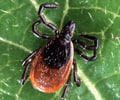
HGA is treatable if detected early. Symptoms include fever, headache and muscle aches, but the infection can reduce a patient's white blood cell and platelet count, leading to organ failure and death.
The illness has mainly affected those aged 40 to 70, state media reported.
"So far we have no details on the general epidemic situation across the country," health ministry spokesman Deng Haihua told a press conference on Friday, calling on authorities in affected provinces to report any cases.
But Deng downplayed suggestions of an official cover-up of the outbreaks, saying it was simply difficult to raise public awareness about a little-known infectious disease.
Henan authorities only announced Wednesday that 557 people had been infected with HGA since May 2007, 18 of them fatally, after a state-run newspaper reported on a fresh outbreak in the city of Xinyang that began months ago.
Advertisement
HGA was first detected in Anhui province in 2006. The health ministry subsequently issued guidelines which stipulate that suspected cases be reported within 24 hours of detection, the China Daily said.
Advertisement
"It is still difficult to pinpoint the pathogen of the disease since it may be caused by a new virus," Wang Shiwen, an expert at the Chinese Centre for Disease Control and Prevention, was quoted as saying by Xinhua news agency.
Source-AFP










